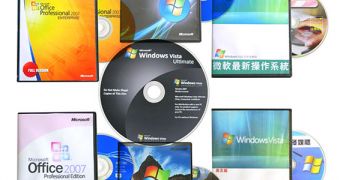Should Microsoft welcome Windows piracy just because there are concerns that fighting it will push users toward adopting the rival Linux and Mac OS X operating systems? I have come across this absurd claim after Microsoft collaborated with the Chinese government and the FBI in helping with the takedown of the largest software counterfeiting syndicate in the world, back at the end of July. But one aspect that was overlooked is that Microsoft participated in the largest bust of counterfeit software manufacturing and distribution, an underground business worth an estimated $2 billion. However, no end users were harmed.
When Microsoft first introduced the Windows Genuine Advantage anti-piracy tool, it caused quite a lot of fear among end users of the operating system. Alex Kochis, Senior Product Manager for Windows Genuine Advantage highlighted the "true purpose of WGA: to help people identify counterfeit software to protect themselves and Microsoft products from this type of activity. WGA's goal is not to punish the people who purchased these programs; they, of all people, are the most victimized. The goal is to give these people a tool to let them know they have been victimized and can do something about it."
Microsoft is not after the users that paid for a pirated copy of Windows Vista, knowingly or not. Policing end users is virtually impossible and would have nasty consequences on the company's image. Now that would indeed turn customers away. But the fact of the matter is that every Windows pirate is also a potential Windows buyer. Not the most orthodox methods of marketing, but there is no such thing as bad publicity, right? Even Windows Vista pirates are still Microsoft customers. The company is not fighting them but the organizations on the black market that are monetizing software piracy.
"Windows Vista is for me, the first time Microsoft has ever provided such a comprehensive set of SDK's and API's to empower developers from all walks of life, to really dig in and make use of the operating system," stated Scott Barnes, Microsoft Developer Evangelis on an unrelated subject, but the example is relevant due to his perspective (emphasis added). "if you looked at the journey Microsoft took from Windows XP to Windows Vista, it was really about interoperability (how could people use the operating system other then via prescribed way), in that the development teams wanted to provide a way in which customers (that means you, yes even if you pirated vista it still includes you) can go deep within or simply execute on applications on the surface."

 14 DAY TRIAL //
14 DAY TRIAL //